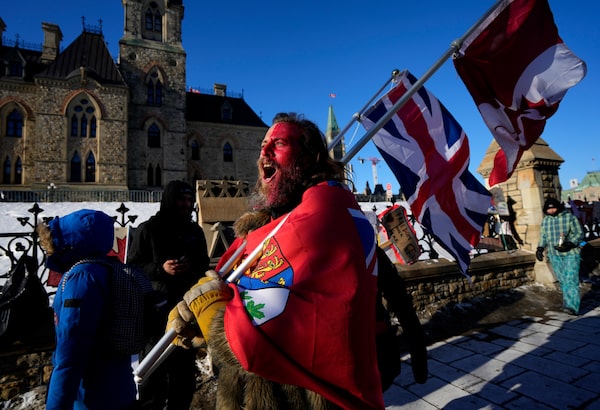
A protester yells “freedom” towards a person who attempted to stick a paper sign on a truck criticizing the so called “Freedom Convoy,” a protest against COVID-19 measures that has grown into a broader anti-government protest, on its 18th day, in Ottawa, on Feb. 14, 2022.Justin Tang/The Canadian Press
Ottawa says it spent more than $2.2-million unsuccessfully fighting a court challenge to its decision to invoke the Emergencies Act to quell the truckers’ convoy protests that gridlocked Parliament Hill and jammed some border crossings in 2022.
The cost of the litigation, disclosed by the Department of Justice in a reply to a question from a Conservative MP, is being condemned as excessive. The bill included the “notional amount” for the services of government lawyers, who are public servants and worked on the case, as well as outside legal services.
In a reply to Marilyn Gladu, Conservative civil liberties critic, the Department of Justice said the total legal costs associated with the federal court cases was around $2,231,000.
Ottawa invoked the act for the first time in February, 2022, saying there was a threat to the security of Canada, after hundreds of trucks and thousands of protesters converged on downtown Ottawa for weeks. Elsewhere, border blockades impeded trade.
But the federal court ruled in January that the federal cabinet acted unreasonably and was not legally justified in invoking the act to deal with the protests. The federal government has said it is appealing the case.
“Justin Trudeau’s unlawful decision to suspend Canadians’ civil liberties and invoke the Emergencies Act was unnecessary from the start. Instead of admitting he and his government illegally violated Canadians’ charter rights, as the highest court in the land ruled, Trudeau’s Liberal government poured millions of taxpayer dollars into lawyers and bureaucrats to try and defend his actions,” Ms. Gladu said.
The Canadian Civil Liberties Association and Canadian Constitution Foundation, as well as a group of nurses, and people who took part in the convoy protests, successfully challenged the Ottawa’s use of the act in court and whether it was reasonable in the circumstances.
Justice Richard Mosley ruled the government had failed to prove that there was an emergency, as defined by the Emergencies Act, with the protests not meeting the high threshold of a threat to the country’s security.
The ruling also found that freezing the bank accounts of convoy participants – through regulations made as a result of the invocation of the act – violated Charter rights.
“It was absolutely unacceptable for the government to impose the Emergencies Act and freeze innocent people’s bank accounts and it’s completely wrong for the government to spend millions of tax dollars trying to defend what it did,” said Franco Terrazzano, federal director of the Canadian Taxpayers Federation.
Government lawyers record time spent on cases, as do lawyers in private practice who often bill per hour. It is common practice for federal lawyers to bill another government department for legal services.
“The services targeted here are litigation services provided in these cases by the Department of Justice, as well as litigation support services. Department of Justice lawyers, notaries and paralegals are salaried public servants and therefore no legal fees are incurred for their services,” the parliamentary reply by the Justice Department said.
Aurora Chiu, a Justice Department spokesperson, said it had waived solicitor-client privilege to reveal the total legal costs, but could not break them down.